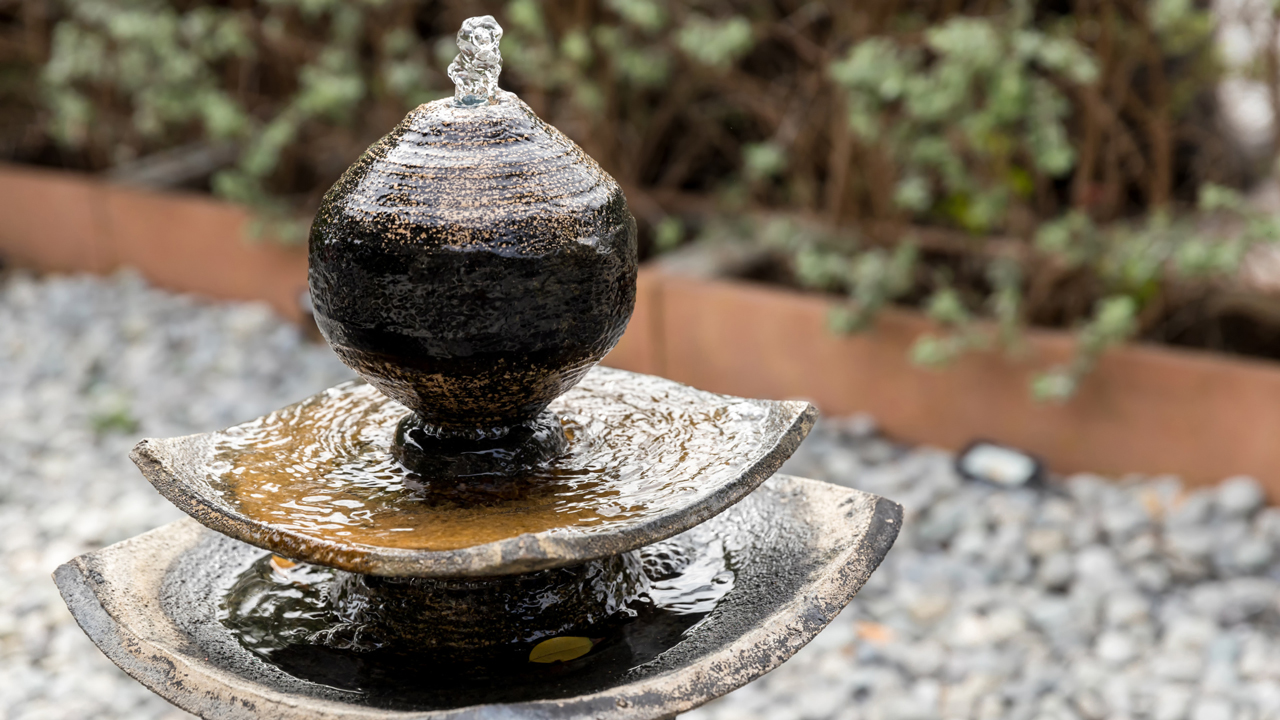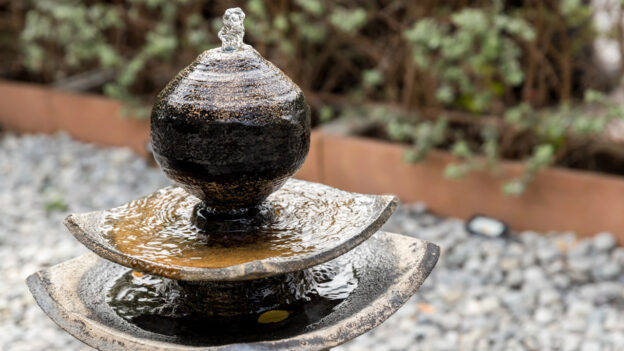 Maintaining the beauty of a fountain in your garden or outdoor space can be a delightful experience. However, with the serenity comes the persistent issue of algae growth. Algae not only ruins the aesthetics of your water feature but can also pose potential risks to the delicate ecosystem that thrives around it.
Maintaining the beauty of a fountain in your garden or outdoor space can be a delightful experience. However, with the serenity comes the persistent issue of algae growth. Algae not only ruins the aesthetics of your water feature but can also pose potential risks to the delicate ecosystem that thrives around it.
When considering the health of your water features and the well-being of the birds that visit it, opting for eco-friendly and bird-safe algae control for fountains becomes paramount. Let’s explore effective methods to keep your fountain water clean and algae-free while ensuring the safety of our feathered friends.
Understanding the Impact of Algae Buildup
Algae, those green, slimy invaders, can quickly turn your clear, fresh water into a murky mess. They thrive in bodies of water that receive sunlight and nutrients, which are often abundantly available in fountains.
While some algae growth is natural and even essential for aquatic ecosystems, an excessive buildup can lead to a cascade of problems. Not only does it compromise the aesthetic appeal of your water feature, but it can also affect water quality, oxygen levels, and the overall balance of the ecosystem.
The Risk to Avian Life
Birds are not just visitors to your garden; they are an integral part of it. From sipping water to bathing and preening, birds rely on accessible water sources to maintain their hygiene and stay refreshed. Stagnant water in different fountains and bird baths can become a breeding ground for harmful bacteria and parasites, putting the health of our avian friends at risk.
Algae overgrowth, especially harmful algal blooms, can release toxins into the gallons of water, making it dangerous for birds to consume. It’s not just the water quality that’s at stake — algae-covered surfaces can be slippery, leading to accidents and injuries among the birds.
Bird-Friendly Algae Control Methods
Maintaining a balance between the needs of birds and the prevention of algae growth can be achieved through eco-friendly solutions. These methods not only ensure the safety of birds but also promote a healthier environment overall.
Implementing Regular Cleaning
The age-old saying an ounce of prevention is worth a pound of cure holds true when it comes to maintaining your outdoor fountain. Regular cleanings are your first line of defense against algae growth. Remove debris, fallen leaves, and other organic matter that contribute to nutrient buildup. This will deprive the algae of the sustenance they need to flourish.
Embracing the Power of White Vinegar
Will vinegar in the fountain harm birds? The answer is no if used correctly. White vinegar is a versatile natural solution that can effectively control algae without harming birds or other wildlife. It’s a common household item that can work wonders in your fountain.
Mix one part of white vinegar with nine parts of water and use this solution to scrub the fountain’s surfaces. Vinegar helps in breaking down algae and preventing its growth. Remember, it’s crucial to rinse the fountain thoroughly after cleaning to ensure there’s no residual vinegar that could be harmful.
Utilizing Beneficial Bacteria
Beneficial bacteria are your allies in the battle against harmful microbes and algae. These natural microorganisms compete with the harmful bacteria for resources, keeping their population in check.
You can find concentrated beneficial bacteria formulas in pet stores or garden centers. These solutions introduce a healthy dose of good bacteria to your fountain, promoting a balanced ecosystem that discourages the growth of algae.
Getting Fountain Cleaners
Several eco-friendly fountain cleaners are available in the market, offering a combination of natural ingredients and advanced technology. These cleaners often come in a concentrated formula that can be diluted and applied to the fountain surface.
They break down the nutrients that support algae growth, helping to keep the water fresh and clean. When opting for a fountain cleaner, look for products specifically designed to be safe for birds and other wildlife.
Taking Advantage of Water Circulation
Installing a water pump in your fountain can be a game-changer. Moving water is less likely to develop algae compared to stagnant water.
A water pump keeps the clean water in constant motion, making it challenging for algae to take hold. This not only contributes to water freshness but also adds an enchanting dynamic to your fountain.
Scheduling Deep Cleanings
What’s the deal with regular vs. deep cleaning? A combination of both is necessary as a preventative measure. While regular cleanings focus on surface maintenance, a periodic deep cleaning ensures that hidden nooks and crannies are algae-free.
For a deep cleanse, turn off the water pump, drain the fountain, and scrub every corner with a mild scrub brush. Rinse thoroughly and refill with fresh water. Deep cleanings, ideally done a few times a year, are integral for preventing algae buildup in hard-to-reach spots.
Transform Your Fountain into a Pristine Oasis with Orange County Pond and Fountain Services
Say goodbye to pesky algae and hello to a haven of crystal-clear water for both you and your feathered friends. Discover the ultimate bird-safe algae control for fountains with Orange County Pond and Fountain Services–your go-to fountain services provider.
Our expert team specializes in turning dirty water into dazzling spectacles while prioritizing the well-being of your garden’s avian visitors.
Don’t miss out on the chance to create a harmonious haven in your outdoor space. Contact Orange County Pond and Fountain Services today at 949-653-2305, and let’s make your fountain shine like never before!
Frequently Asked Questions: Fountain Water Maintenance for Birds
1. How frequently should I clean my fountain water for the benefit of birds?
To ensure the safety of birds, it’s advisable to clean your fountain water at least once a week. This helps remove potential contaminants like dirt and debris.
2. What’s the recommended cleaning solution for my fountain water?
For effective cleaning without posing any harm to birds, use a mixture of mild soap and water. It’s crucial to avoid the use of harsh chemicals or bleach, which can be detrimental to both birds and the environment.
3. Can I use chemicals to maintain the cleanliness of my fountain water?
No, it’s not recommended to introduce chemicals into your fountain water. Chemicals can have adverse effects on birds, plant life, and the environment. Instead, rely on regular cleaning and maintenance practices to keep your fountain water clean and bird-friendly.
4. How can I prevent the growth of algae in my fountain water?
To inhibit algae growth, ensure consistent water movement through the use of a pump or a fountain with a built-in circulation system. Additionally, avoid exposing your fountain to direct sunlight, as this can encourage algae growth. Regular cleaning and maintenance routines are also effective in preventing algae.
5. Can bird droppings harm the quality of my fountain water?
Yes, bird droppings can introduce harmful bacteria and parasites into your fountain water, posing risks to both birds and humans. Always promptly clean up bird droppings and adhere to a regular cleaning and maintenance schedule to maintain the cleanliness and safety of your fountain water.
6. What safety precautions should I take when cleaning my fountain water for the sake of birds?
When cleaning your fountain water, be sure to unplug the fountain and drain the water to avoid any risk of electric shock. If necessary, use gloves and eye protection. Moreover, ensure that you dispose of any contaminated water responsibly, refraining from pouring it into storm drains, sewers, or natural bodies of water.
